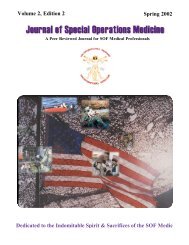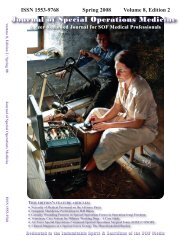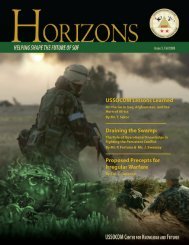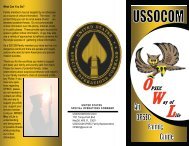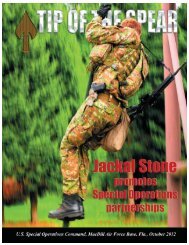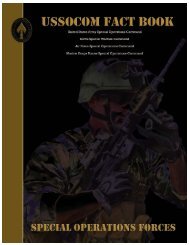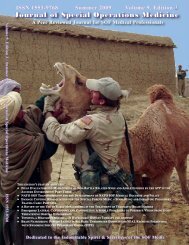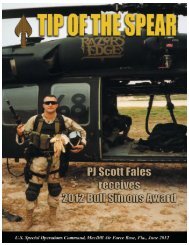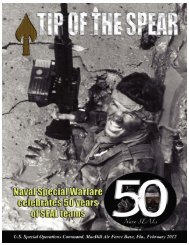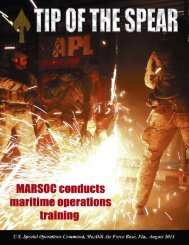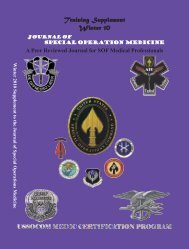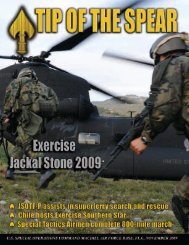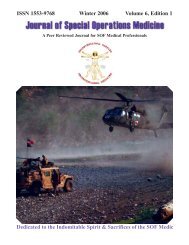HQ$History - United States Special Operations Command
HQ$History - United States Special Operations Command
HQ$History - United States Special Operations Command
Create successful ePaper yourself
Turn your PDF publications into a flip-book with our unique Google optimized e-Paper software.
ing thousands of acres of land to productive use.<br />
EUCOM reviewed the program in 1999 and concluded<br />
that the SOF-developed training centers<br />
continued to produce effective deminers and had<br />
become an integral part of the nation’s demining<br />
operations. The training mission’s success was<br />
attributed to SOF’s ability to develop a rapport<br />
with each of the entity armies and to inculcate a<br />
higher degree of professionalism in them.<br />
By late 1999, humanitarian demining operations<br />
had been conducted by SOCCENT, SOC-<br />
PAC, SOCSOUTH, and SOCEUR; all five activeduty<br />
<strong>Special</strong> Forces Groups; all six active-duty<br />
Psychological <strong>Operations</strong> Battalions (POBs);<br />
and the active-duty CA BN. The reserve components<br />
fully supported these operations, as well.<br />
In Asia, for instance, SOCPAC, the 1st SFG (A),<br />
the POB, and CA troops worked with the national<br />
governments of Cambodia and the People’s<br />
Republic of Laos, the UN, and many non-governmental<br />
organizations to make people aware of<br />
the landmine danger and to help clear mined<br />
areas.<br />
SOF had conducted humanitarian mine<br />
action activities in the following countries for<br />
FY2002: Ecuador, Nicaragua, Honduras,<br />
Guatemala, Armenia, Azerbaijan, Cambodia,<br />
Estonia, Honduras, Mauritania, Thailand, and<br />
Vietnam.<br />
African Crisis Response Initiative<br />
In 1994, Rwanda experienced human genocide<br />
of horrific proportions. As a result of these<br />
atrocities, U.S. officials from the OSD<br />
visited the Rwandan massacre sites,<br />
spoke with refugees, and issued a<br />
report that helped to focus attention on<br />
the region. The next year, Burundi,<br />
Rwanda’s neighbor to the south, also<br />
experienced political unrest and<br />
appeared to be heading down the same<br />
road that Rwanda had traveled some<br />
months before. By November 1995, the<br />
Defense Department had drafted a proposal<br />
to deal with the unrest in<br />
Burundi, the centerpiece of which was<br />
the training of African peacekeeping<br />
troops. The objective was to train<br />
African troops to conduct peacekeeping<br />
operations within their continent. This<br />
initial proposal would become the core for the<br />
African Crisis Response Initiative (ACRI), which<br />
the State Department launched in October 1996.<br />
The U.S., however, worked only with those<br />
African countries that met certain prerequisites,<br />
including democratically elected governments,<br />
civilian control of the military, and human<br />
rights policies. SOF, and especially <strong>Special</strong><br />
Forces soldiers, became an integral part of<br />
ACRI.<br />
The ACRI used military assets from the U.S.<br />
and its European allies to train battalion-sized<br />
units from various African nations for peacekeeping<br />
operations on their continent. The 3rd<br />
SFG (A) implemented the ACRI plan by developing<br />
a program of instruction and sending in<br />
teams to conduct training. Drawing from<br />
NATO, UN, and U.S. doctrine, <strong>Special</strong> Forces<br />
planners developed common peacekeeping tactics,<br />
techniques, and procedures. Training<br />
African battalions to common doctrine and standards<br />
assured that the different forces could<br />
effectively work together if deployed on a peacekeeping<br />
mission. As devised by the 3rd SFG (A),<br />
ACRI training consisted of two phases: an initial,<br />
intensive 60-day training period (individual,<br />
platoon, company, leader and staff training)<br />
followed by sustainment training and exercises.<br />
By the end of FY2001, <strong>Special</strong> Forces teams,<br />
along with elements of the 96th CA BN and the<br />
4th POG, had conducted ACRI training in<br />
Senegal, Malawi, Ghana, Mali, Benin, Kenya,<br />
and the Ivory Coast. This multinational peace-<br />
<strong>Special</strong> Forces instructors train Senegalese soldiers in marksmanship<br />
and other basic soldier skills for ACRI.<br />
77



